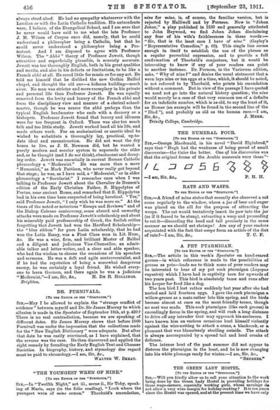" THE YOUNGEST WREN OF NINE." [To THE EDITOR OP
THE "SraorAreit."1
SIR,—In "Twelfth Night," act iii., scene ii., Sir Toby, speak- ing of Maria, says (in the folio reading), " Look where the youngest wren of mine comes." Theobald's emendation,
nine for mine, is, of course, the familiar version, but is rejected by Halliwell and by Furness. Now in "Johan Johan," a play published in 1533 and generally attributed to John Heywood, we find Johan Johan disclaiming any fear of his wife's faithlessness in these words:— "Sir, that is the least care I have of nine" (Gayley's "Representative Comedies," p. 68). This single line seems enough in itself to establish the use of the phrase as a regular proverbial expression, and to provide a full confirmation of Theobald's conjecture, but it would be interesting to know if any of your readers can point to another instance. Dr. Furness, in the -Variorum edition, asks, " Why of nine P" and denies the usual statement that a wren lays nine or ten eggs at a time, which, it should be noted, is not referred to by Theobald, who prints his emendation without a comment. But in view of the passage I have quoted we need not go into the natural history question ; the nine would merely be a case of that very common use of a definite for an indefinite number, which is as old, to say the least of it as Homer (an example will be found in the second line of the "Iliad "), and probably as old as the human race.—I am,






































 Previous page
Previous page